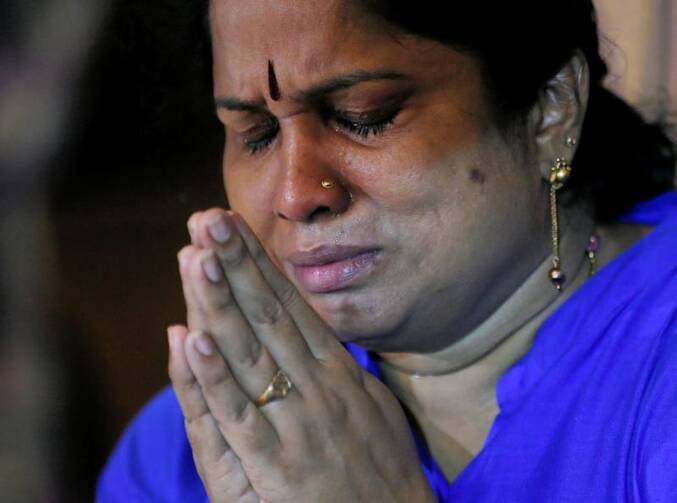NEW YORK (CNS) -- Over half of U.S. Catholics are "very concerned" about global Christian persecution, but this group accounts for 52% of Catholics today, compared to 58% in winter 2019 -- a decline of more than 10%, according to a new poll.
It also showed the number of U.S. Catholics who think Christian persecution is "very severe" declined by 11% compared to a year ago, dropping from 46% to 41%.
Results of the third annual nationwide poll examining the views of U.S. Catholics on the global persecution of Christians were released March 4.
The poll was conducted by McLaughlin & Associates for Aid to the Church in Need-USA, an international papal agency that supports suffering and persecuted Christians in more than 140 countries.
Respondents also ranked global Christian persecution as a less urgent issue than human trafficking, poverty, climate change and the global refugee crisis.
Catholics who described themselves as being "very devout" were most concerned about Christian persecution, but the poll showed that even this group has ranked human trafficking as the issue of greatest concern for three consecutive years.
"While 52% of American Catholics show strong concern about the persecution of Christians, it is nevertheless disheartening to see the drop in their number compared to a year ago," George Marlin, chairman of Aid to the Church in Need-USA, said in a statement.
"It's telling," he said, "that U.S. Catholics consider human trafficking, poverty, climate change, and the refugee crisis -- as important as these issues are -- to be more important than the persecution of Christians."
"Two years ago, the genocidal campaign waged by ISIS against Christians and other minorities in Iraq and Syria had only just begun to decline," Marlin said, "but memories of that atrocity have faded since then."
"This may well help explain the apparently lesser concern" about Christian persecution by U.S. Catholics, he said.
In listing the countries where they believe Christian persecution is most severe, U.S. Catholics identified Iran as the worst offending nation, followed in order by North Korea, Iraq, Syria, Pakistan and Saudi Arabia as the next five worst-offending countries.
Other findings of the poll showed:
-- Just over one-fifth of U.S. Catholics said their parish is "very engaged" on the issue of Christian persecution, up by 16% from a year ago; 20% said their parish is "not engaged"; and 22% were "unsure" about their parish's level of engagement on the issue.
-- As for their local bishop speaking out on Christian persecution, 27% said the bishop was "very engaged" on the issue, up 12% compared to a year ago; 24% were "unsure" about their bishop's level of involvement; and 12% said their bishop was "not engaged" at all.
-- Asked about Pope Francis' focus on the issue, 47% of U.S. Catholics said he was "very engaged" on the issue, down by 8% from a year ago; 16% were "unsure" about the pope's involvement on the issue; just 8% said the pope was "not engaged."
Respondents also were asked to rank by importance policies by the U.S. government and other Western countries to help persecuted Christians. "Putting diplomatic pressure on offending countries" was ranked as most important by U.S. Catholics, followed by economic sanctions and emergency asylum for victims of persecution. Next came financial support of persecuted Christian communities, while military intervention and "the military training and arming" were said to be less important.
Asked what actions U.S. Catholics can personally take to help persecuted Christians, 68% said prayer was "very important," 59% said raising awareness of the plight of the Christians at the parish level was important; 53% and 52%, respectively, said donating to agencies that help persecuted Christians and contacting members of Congress were important.
Marlin said the survey showed that U.S. Catholics believe the U.S. church in America "can do much more when it comes to calling attention to the gravity of Christian persecution." Given the percentage of Catholics who said they were "unsure" about their parish's or bishop's engagement on the issue, or said they were "not engaged, education at the parish and diocesan levels "remains of crucial importance," he added.
He called on the U.S. Catholic church to do more "to inform and galvanize the faithful" on this issue.
He also pointed to current "hot spots of Christian persecution" that he said "must be put in the spotlight" to grab the attention of U.S. Catholics: in Africa, "the persistent Islamist terror" targeting Christians, particularly in Nigeria and also throughout the Sahel region; in India, "the increasingly fanatical Hindu nationalism that threatens Christians; and in China, "the ongoing repression of the church's freedom."
This was a nationwide poll of 1,000 Catholic adults conducted Feb.6-13. Survey invitations were distributed randomly to respondents within predetermined geographic areas; all interviews were conducted online. The margin of error is plus or minus 3.1 percentage points.










